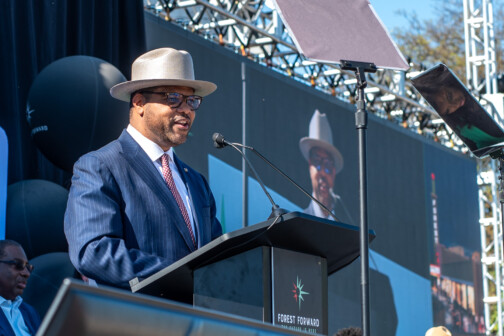The Quick website is still up but presumably not for much longer. Word comes that the weekly publication has been shuttered. Condolences to those who lost their gigs today. More details as they become available.
Update (2:43 p.m.): Jim Moroney, publisher and CEO of the Dallas Morning News, says today was a tough day. “It’s always more fun to start something than it is to shut it down,” he says. “I regretted it. I took a lot of pride in Quick when we launched in 2003 and went head to head with a competitor [A.M. Journal Express] and, I think, did a better job of serving the market.” He went on to praise the Quick staff for their creativity and the editorial voice that they developed.
Moroney says the decision was made to shutter Quick because they couldn’t figure out how to get the publication to do better than break even. So what’s wrong with breaking even? Opportunity cost. Moroney says that as the News adapts to the marketplace and looks for a profitable business model, spending time and effort on a property like Quick that can’t consistently turn a profit doesn’t make sense.
Seven full-time employees and two part-time employees were let go. They have all been invited to apply for open positions at the News, but none was automatically offered a new job with the company.
Update (3:04 p.m.): In 2003, I wrote a story for D Magazine about the launch of Quick and its competitor at the time, A.M. Journal Express. I’ve included that story after the jump.
Newspaper War!
A former News exec launches a new daily — and the News fires back.
By Tim Rogers
To truly appreciate the A.M. Journal Express, the free 140,000-circulation daily paper that Jeremy Halbreich launched in Dallas November 12, you have to track down a copy of the Harvard Crimson from about, oh, 1973. There in the staff box you will find Halbreich’s name alongside that of Robert Decherd, whose great-grandfather was George Dealey, the founding publisher of the Dallas Morning News. The two men worked at the college paper together for three years. When Decherd graduated, he went to work for the family business; Halbreich followed his buddy to the News.
Flash forward to 1998. Halbreich had risen to president of the News, and Decherd had become chairman, president, and CEO of A.H. Belo, the paper’s parent company — which was having its worst year since going public in 1981. In the shake-up that followed, Halbreich stepped down. After 24 years with the paper, he sounded sanguine, saying, “This was my first job out of college. It’s time for a change.” But everyone knew that if Halbreich had jumped ship, he’d done it with a hand planted squarely in his back.
Halbreich says none of this history is relevant to the launch of the Express. Now CEO of his own newspaper company, American Consolidated Media, he says his new venture is strictly business. Nothing personal. He saw other companies starting free dailies in Chicago, Washington, Boston, and Philadelphia, and he spotted an opportunity. Strictly that. In fact, Halbreich says he’s not even competing with the News.
He says the Express — with its mix of national and local stories, each brief enough to be read at a stoplight — will reach those who don’t currently read a daily newspaper and “expand the universe of people reading print products.” He says, “All of our research shows that we won’t take readership or advertising.”
His former co-workers disagree. While the News actually had begun research on its own free daily about a year ago, when executives there learned of Halbreich’s plans, they sprang into action.
It started on Tuesday, October 28, the day Halbreich sent out his press release announcing the new paper. At 8 a.m. he placed a courtesy call to Belo to inform them that in about two weeks he’d be launching Express. Belo executives were just as stunned as outside media observers. Halbreich and his staff had kept their secret exceptionally well. One veteran publisher, when told the news, said simply, “That’s impossible.”
The News’ publisher, James Moroney III, was out of town when Halbreich made the courtesy call. Two days later, Moroney had a previously scheduled meeting with the publishers of the Chicago Tribune, Washington Post, Boston Globe, and Philadelphia Inquirer.
“Based on very good information from other markets where these products compete, there is some sharing of advertisers and readers,” Moroney says. “Yes, it’s competition.”
On Monday, November 10, three days before the Express hit streets, the News launched Quick, a free daily with a circulation of 150,000. In a story that ran in his paper, Decherd sounded almost nonchalant, saying that because Belo is “able to leverage the infrastructure and content of the Dallas Morning News, the incremental investment to produce and distribute Quick is not material.”
The investment may not be material, but the impact on readers and on the News’ once-solid monopoly may be. Dallas is once again a two — and now three — newspaper town. Dallas hasn’t had so many daily newspapers since the 1920s.
Media observers are licking their chops at the prospect of a return to Front Page days when competing journalists knew how to get down and dirty. For example, in 1907, after Denver Rocky Mountain News owner Thomas Patterson called Denver Post owner Frederick Bonfils a blackmailer in a cartoon, Bonfils attacked and beat Patterson as the 67-year-old was taking a stroll.
The first victim of the Dallas war will be the News’ monopoly advertising rates. If that doesn’t cause a street brawl, the competition for readers will.





